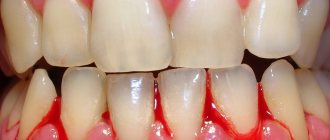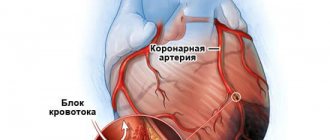With proper treatment, the cough should go away after 7-10 days. If a person is plagued by painful coughing attacks for 2 weeks or even a month, it can be assumed that the disease has protracted or become chronic. Perhaps the patient is being treated incorrectly or the doctor has made an incorrect diagnosis. If the cough does not go away for a month, what should I do? Does an adult have some serious illness or is everything fine with him?
Related articles:
Treatment of dry cough in an adult Causes of dry paroxysmal cough and treatment Using Erespal syrup for coughs - instructions Cough with green sputum: causes and treatment How to take elecampane for cough - recipes
Why does cough persist for a long time in an adult?
A persistent cough is a dangerous symptom that indicates a serious illness. Common causes: gastroesophageal reflux disease, bronchial asthma, heart failure, respiratory problems, colds, viruses.
A prolonged cough is usually accompanied by other symptoms: severe shortness of breath, chest pain, lethargy, colored sputum (yellowish, greenish, etc.), whistling and loss of voice.
If the urge to cough does not go away for a long time, you need to consult a doctor who will prescribe medication and draw up a therapeutic course.
After pneumonia
Residual cough after pneumonia, gradually fading, can persist for up to 1 month, which should not cause concern. A person who has had pneumonia continues to cough due to the slow recovery of lung tissue. In approximately 30% of those who have suffered the disease, the functional tissue is not restored at all: the affected areas become sclerotic, decrease in size, shrink, their blood supply is disrupted, and foci appear that predispose to the development of an infectious process.
If the cough does not go away after pneumonia, the doctor draws up the last stage of the therapeutic course: prescribes medications to help eliminate the urge.
In adults, the urge to cough after pneumonia lasts longer than in children. In such cases, drugs of peripheral and central action are prescribed that suppress cough reflexes. Along with this, the specialist prescribes training exercises for the lungs, percussion massage, and inhalations.
After a cold
A residual dry cough is a common occurrence after suffering from a cold. It indicates that the body is recovering from an illness. If a person has bad habits, the urge gets worse (for example, under the influence of tobacco). Due to the decrease in local immunity of the respiratory tract, recovery is slower, and in some cases the bacterial infection may recur.
If the cough does not go away after a cold, drug therapy is extended under the supervision of a doctor. If you ignore the urge to cough, there is a high probability of the disease becoming chronic.
Causes of a severe dry cough
Anything can cause it to occur; even a small speck of dust that gets into the throat can cause irritation and become the starting point. The reasons for the appearance are a variety of viral ailments: influenza, bronchitis, pneumonia, etc.
Also, a severe cough in an adult without fever can be caused by the following factors and diseases:
- smoking tobacco . Tobacco tar causes irritation in the bronchi;
- dust . People who are often in dusty rooms with very dry air may soon complain of a sore throat;
- foreign bodies . When such a body enters the respiratory tract, the urge to cough begins. These are often dust particles;
- asthma . It appears at night with painful sensations in the abdomen and bust;
- deviations of ENT organs of a chronic nature. Many are born with abnormalities of the nasopharynx: acute tracheitis, frontal sinusitis , sinusitis in which a dry cough is normal. It is triggered by mucus running down the throat from the mouth;
- allergy. Cases of dry cough due to a reaction to animal fur, pollen of certain plants, and chemicals are not exceptional;
- viral infections. All kinds of diseases: bronchitis, influenza, ARVI, whooping cough;
- oncological pathologies . Scientists believe that if a dry cough is tormented for a long period, which is accompanied by a strong fever, then the patient should immediately be examined by an oncologist. There is a possibility of cancer of the throat, bronchi, lungs or trachea;
- thyroid diseases. If growths have appeared in the thyroid gland, then the cough occurs as a result of pressure on the trachea;
- heart failure. Ailments of the heart muscle manifest themselves due to extreme physical exertion, accompanied by shortness of breath and rapid heartbeat. Sometimes, during an acute form of cardiac abnormalities, blood mucus is released when coughing;
- ailments of the intestines and stomach. Due to the occurrence of a fistula in the esophageal-tracheal cavity or other similar diseases, a reflex dry cough arises after eating;
- tuberculosis. If there is a strong cough to the point of vomiting in an adult, this may be a signal for the presence of pulmonary tuberculosis.
Regarding tuberculosis, the disease arises as a result of decreased immunity, and Koch’s bacillus begins to become active in the body. 80% of the country's residents, people over 30, have it.
conclusions
- The causes of prolonged cough can be various diseases, bad habits, or work in chemical production.
- Before making a diagnosis, the doctor studies the patient’s medical history, asks about lifestyle, and the presence of allergies.
- It is strongly recommended not to take cough suppressants without consulting your doctor.
The information in this article is provided for informational purposes only. Contact your doctor if your cough persists for more than 3 weeks.
Treatment of dry cough
You can get rid of it by properly following the prescribed treatment. Medicines must be taken exactly as prescribed.
You can restore your normal way of life only by taking medications prescribed by your doctor. Medicines should relieve the patient from the fatigued condition.
If you have a cough that is not accompanied by mucus production, you need to do everything to thin the mucus and change the cough to a productive one. Therefore, expectorant and mucolytic substances are attributed. Based on the diagnosis, the doctor can prescribe medications with complex effects.
There are a number of effective syrups that promote the rapid removal of mucus and dilute it. These include:
- "Herbion". Consists of natural ingredients, in particular plantain. It has antitussive, expectorant, antimicrobial and anti-inflammatory effects. The syrup softens and facilitates coughing;
- "Sinecode". Contains natural ingredients. The drug has expectorant properties and has an anti-inflammatory and bronchodilator effect. Helps improve spirometry. The syrup has a direct effect on the cough center;
- "Stoptussin." Is a combination medication. The tablets have an antitussive, secretolytic effect. Reduces the viscosity of mucus and improves its removal. Effective for severe dry cough.
These medications are popular, but only the attending physician can decide how to treat a cough in an adult.
Only a doctor has the right to prescribe medications to combat coughing. But sometimes folk remedies also have a serious effect on eliminating coughing.
Antibiotics: when should they be used to treat a cough?
In what cases should antibiotic therapy be used? Such medications are used in situations where there are complications such as pharyngitis, sore throat or pneumonia. Such remedies will help prevent the occurrence of chronic forms of the disease. Typically, specialists prescribe the following antibiotics to treat a persistent cough:
- Ciprofloxacin;
- Azithromycin;
- Suprax;
- Amoxicillin.
If a detailed examination shows that the cause of a lingering cough is a pathogenic bacterial microflora, the specialist selects the required dosage and duration of taking such drugs.
As for self-treatment with such drugs, experts say that the wrong drug can lead to complications. It is best to carry out antibiotic therapy as prescribed by specialists. In addition, you need to remember that such medications affect the functioning of the gastrointestinal tract, so they are taken together with probiotics.
What to do if the cough does not stop for a week
Cough is an involuntary expiratory reflex that occurs as a result of irritation of the mucous membrane of the larynx, bronchi or throat and lung tissue. Thanks to this symptom, the airways are cleared of foreign bodies, harmful microorganisms, mucus, dust and sputum.
The reasons that provoke a prolonged cough include:
- colds;
- allergies;
- emotional overstrain.
Moreover, the cough can be wet or dry, night, daytime, periodic, paroxysmal, etc.
Treatment of weekly cough
If the cause of a week's cough is an acute respiratory infection.
then the doctor prescribes antitussives, but you cannot take antibiotics, since they only affect bacteria. But antibacterial agents may be appropriate for bronchitis and pneumonia, which are accompanied by symptoms such as fever and severe cough. In addition to antibiotics, if a severe cough does not go away for a week, expectorants based on medicinal plants are prescribed. In addition, the doctor can prescribe immunomodulatory drugs that activate the body's protective functions and reduce the effect of antiviral drugs.
It is worth noting that if the cough not only does not go away for more than a week, but is also accompanied by chest pain, high temperature (38 or more), and when coughing up bloody, green or yellow sputum is released, then you cannot self-medicate, but you must quickly contact doctor.
There are some recommendations that are important to follow when treating a persistent cough in an adult. To prevent your throat from getting dry, you need to drink plenty of fluids.
For this purpose, you can drink warm milk with honey every evening.
Fruit drinks and juices are no less useful. In addition, if a dry cough does not go away for more than a week, you should drink fresh black radish juice (1 tablespoon three times a day).
Use of medicinal herbs
Traditional medicine often helps if the cough lasts longer than two weeks. The advantage of medicinal herbs is that they can be used for a long time.
The most effective way to combat the consequences of a cold is breastfeeding.
It comes in four types, depending on the composition:
- Breast collection No. 1 includes three herbs: oregano, marshmallow root and coltsfoot. Has an antiseptic and expectorant effect. Allergic reactions to one of the components are possible.
- Ingredients of breast collection No. 2: licorice root, coltsfoot, plantain. It is prescribed for pathologies of the bronchopulmonary system.
- Breast collection No. 3 has slightly more components. It includes pine buds, marshmallow root, licorice root, anise and sage. The drug has an anti-inflammatory effect and is prescribed for dry cough.
- Breast collection No. 4 is characterized by anti-inflammatory and expectorant properties. It includes licorice root, calendula, wild rosemary, mint, violet and chamomile flowers.
Preventive measures
To prevent the cough from dragging on for the second month, it is necessary to follow certain preventive measures:
- Avoid overheating and hypothermia;
- Monitor the air humidity in the rooms where you spend most of the time;
- Do not use household chemicals in a poorly ventilated area and without gloves;
- Use protective equipment at work;
- Install a humidifier in the bedroom;
- Ventilate the apartment and office;
- Undergo medical examinations, including fluorograms.
The above rules will significantly reduce the risk of lung diseases. Strengthening the immune system and a healthy lifestyle will help protect the body from respiratory infections that are transmitted by airborne droplets.
Should I take an x-ray if I have a cough?
Often, a patient comes to a doctor, complains of feeling unwell and asks for a detailed examination: a cardiogram, a computed tomograph and an ultrasound - at a time when, according to the correct algorithm, even an x-ray is not always done.
If a person just has a cough, but everything else is more or less normal, then an x-ray is not needed. It is prescribed only when the patient has deviations in simple indicators: pulse and number of respiratory movements.
If you breathe more often than 24 times per minute, and your pulse is more than 100, and your temperature is more than 38 ° C, then there is a reason for an x-ray to rule out pneumonia. In all other cases, it is considered that neither examination nor treatment of the patient with antibiotics is necessary. He just needs therapy to relieve his symptoms (be careful with drugs containing codeine!).
Back to contents
Diagnostics
It is possible to identify the exact cause of coughing only after a comprehensive study. It is necessary to undergo examination by a specialist as early as possible in order to avoid various serious exacerbations. For this reason, when the first symptoms occur, you should seek help from a doctor. To identify the cause of this pathology, it is necessary to undergo the following examinations:
- fluorography;
- clinical blood test;
- blood chemistry;
- X-ray of the lungs.
If any difficulties arise, more qualitative research may be required:
- magnetic resonance imaging of the chest;
- computed tomography of the chest;
- analysis of mucous discharge.
If at the time of respiration the patient experiences pain in the chest, then in addition to the main methods, specific procedures such as percussion of the lungs and auscultation of the lungs can be performed. After completing all the necessary procedures, the specialist will be able to make an accurate diagnosis, according to which competent treatment will be prescribed.
Prevention measures
Experts say that the appearance of a lingering cough can be prevented if you follow some rules:
- You need to eat food rich in vitamins.
- It is necessary to give up alcohol and cigarettes. They negatively affect human immunity.
- A person should avoid hypothermia and changes in air temperature.
- If you become aware of an epidemic of a viral infection, you must avoid public places.
- It is imperative to monitor home hygiene. Dust can cause coughing.
- Breathing exercises will help strengthen the body.
To avoid colds and coughs, you need to dress warmly during cold weather. You must cover your neck with a scarf; you cannot go outside in winter without gloves and mittens. Warm socks should be on your feet. Shoes should not be too tight or too small, because this leads to hypothermia. A warmly dressed person resists cold, frosty air, protects himself from hypothermia and illness.
As soon as the first signs of a cold appear, a sore throat is felt, a cough appears, it is necessary to be treated immediately. It is recommended to visit a doctor and consult with him in choosing medications. In the early stages, a cough is much easier to cure before it becomes protracted.
A person who is attentive to his health will make every effort to prevent the development of a lingering cough. You need to strengthen your immune system, take vitamins and, if necessary, visit a doctor. These measures will help a person avoid such an unpleasant, long-lasting phenomenon.
Which doctor should I contact?
If a dry, expectorating cough persists for more than 4 weeks, visit your doctor or pediatrician. After an examination, questioning, and initial diagnosis, the doctor will write a referral to a specialized specialist. Diseases that are accompanied by prolonged coughing are treated by a pulmonologist, an allergist, a phthisiatrician, a cardiologist, and an infectious disease specialist.
Treatment errors
The most common cause of a prolonged cough is errors in the treatment of a common cold.
In first place in the ranking of annoying mistakes is a negligent attitude towards the disease and the hope that sooner or later the cough will go away on its own. It is dangerous to cough and only slightly “heal”, for example, by putting mustard plasters before bed or by steaming over potatoes. Most likely, this will not bring the expected effect, and the cough will only get worse. In addition, thousands of people go to work coughing and send coughing children to school or kindergarten. Also, you should not self-prescribe antibiotics or take expectorants at the first signs of illness.
Research and diagnostics
Before treating the disease, the doctor collects anamnesis by questioning, examines the patient, performs auscultation, percussion, palpation of the chest, and, if necessary, refers him for additional examination. This includes a whole range of diagnostic measures, including the following methods:
- Fluorography. It is considered the simplest, most informative and cheapest way, allowing one to accurately determine the condition of the bronchial tree and lungs. Currently, it is necessarily used in primary studies for tuberculosis and oncology.
- Spirography. This clinical method measures lung volume. Natural and recorded breathing is used to record changes. Test results make it possible to establish the causes of frequent dizziness, identify the presence of bronchial obstruction of the lungs and other dangerous pathologies. During the study, the volume of oxygen absorbed during inspiration is assessed and compared with the amount of carbon dioxide eliminated during exhalation.
- Bronchoscopy. Clarifies data from primary studies for persistent cough. During this procedure, the trachea and bronchi are examined from the inside, and areas of suspicious tissue are taken for histology. At the same time, the airways are cleared of excess accumulated viscous mucus. It is considered the most informative method with which tumors and formations of even the smallest sizes are determined.
- Bacteriological analysis of secreted sputum. At the same time, a culture is done to test the sensitivity of pathogenic microbes to antibacterial agents.
Folk remedies
If you use unconventional remedies in combination with medications, you can get positive results within a few days.
Thyme
This herb is one of the most effective in treating persistent cough. You can prepare a decoction based on it. Take 20 g of herb and pour a glass of boiling water. Leave the medicine for 1 hour to infuse. Filter the finished product and take 20 ml 3 times a day.
Thyme has a powerful expectorant effect. In addition, it can be used to disinfect the respiratory system, eliminating pathogenic bacteria. If you regularly take a decoction of thyme, the cough will begin to subside and will soon go away completely.
Black radish juice
To prepare the juice, you need to take a radish, wash it and make a small hole in it. Place 20 g of honey there. After 3 hours, you will see that juice has accumulated in the hole. Now cut the radish into pieces and sprinkle with sugar. After 4 hours, the juice will be released again. Take it 20 ml 3 times a day. Radish juice is considered one of the most effective folk remedies for combating persistent cough in children and adults. This is due to the fact that the product effectively removes accumulated mucus and stops coughing. Within a few days the patient will feel better, and all unpleasant symptoms will disappear.
Milkshake
To get a medicinal cocktail, take 200 ml of milk and boil it. Add 4 figs there, just chop them finely before doing this. Mix all ingredients and cover with a towel until the mixture cools. Take the resulting medicine 100 ml 3 times a day. You can also use the mixture to wipe the chest. If you do this all at the same time, the therapeutic effect will only increase.
Lemon juice
Since lemon contains many vitamins, it is useful to use in the treatment of cough. You need to take fresh citrus, grind it with sugar and use the medicine 2-3 times a day. After 2-3 days, the cough will be defeated, and all pathogenic microorganisms will disappear from the respiratory tract. In addition, lemon juice perfectly improves immunity and strengthens the body.
Homemade compress
To obtain an effective compress, you need to combine 20 g of the following products: dry mustard, flour, honey, vodka, aloe juice and interior fat. If the last component is not available, then you can use pork fat or vegetable oil. After mixing all the ingredients, they should be heated in a water bath. Place gauze on your back, lubricate the bronchial area with the resulting mixture, and place another layer of gauze on top. Insulate your back with polyethylene and a scarf. So go to bed and remove the compress in the morning. You can also place it on the upper chest area. Using this procedure, you can quickly cure a lingering cough and improve your well-being. To get the desired result, apply 3-4 compresses.
Birch branches
This method is excellent for treating an old cough that occurs against the background of bronchitis. In the spring, you need to pick birch branches that have swelling buds. Chop them finely and for 40 g of raw materials you need 1 liter of milk. Place on the stove, simmer on low until 0.5 liters of broth remains. Now leave for 2 hours and filter. It is necessary to take 200 ml of medicine 3 times a day. But only add 10 g of bear fat there. If such an ingredient is not available, then you can use goat, lamb or beef fat.
Onion
Using onions can be an excellent remedy for a lingering cough. If you need to cure an illness in children, then take the onion mass and fill it with a bottle. Then pour dough over it and place it in the oven. The bottle will remain there until the dough is completely baked. Remove it from the oven and wait until it cools down. Now you can completely remove the dough and open the container. For children, give the medicine ½ teaspoon, and for adults – 2 spoons 4 times a day.
You can learn more about the causes and treatment of lingering cough in children and adults from the following video:
A lingering cough is a common pathological process today that can affect both adults and children. You can fight it only after the reason becomes clear. Treatment must be comprehensive. Its goal is to relieve not only the cough itself, but also the cause that influenced its development.
General recommendations from doctors
You can reduce the risk of a prolonged cough by following simple advice from specialized specialists. The rules boil down to supporting general health and timely treatment of viral, infectious and bacterial lesions of the respiratory tract.
How to treat a persistent cough at home without using medications:
- periodically ventilate the room;
- provide comfortable humidity (steam generators, air conditioning);
- eliminate exposure to external irritants (household chemicals, dust, animal hair);
- perform breathing exercises (lung development is best done in the fresh air);
- take vitamin support complexes.
To prevent a long cough, you need to avoid hypothermia (dress appropriately for the weather), try to reduce contact with people during seasonal flu epidemics, and get vaccinated. It would be useful to periodically undergo fluorography to exclude the possibility of tuberculosis and pneumonia.
What to do if your child’s cough won’t go away
If a child’s cough does not go away for a long time, the first thing to do is to identify the cause of this condition. If coughing bothers you after an illness (ARVI, influenza, bronchitis, etc.), then in this case the cough may be associated with the recovery period. Harmful microorganisms weaken the body, provoke inflammation and irritation of the mucous membranes of the respiratory tract, and the body needs time to completely free the bronchi from mucus residues and restore the epithelium.
In this case, coughing does not pose a danger; usually the child coughs occasionally, and there may be a slight discharge of sputum.
It is worth noting that each body is individual, and the recovery process in each individual case proceeds differently and can sometimes drag on for months.
If the cough continues for more than three weeks, while the amount of sputum increases, the cough becomes stronger, it is necessary to show the child to the doctor, as in this case there may be a secondary infection, the development of complications or a severe allergic reaction.
Folk remedies for cough
If the cough does not go away for a long time, you can use folk remedies that will help soothe the irritated mucous membrane, improve the process of removing phlegm and speed up the healing process:
- Infusion of dill seeds - take 1 tsp. dill seeds, crush, pour 250 ml of boiling water, leave for 20-25 minutes. It is recommended to drink this infusion instead of water throughout the day until complete recovery.
- Serum with garlic – 2 tbsp. garlic pour 250 ml of cow's milk whey and put on fire, immediately after boiling, remove from heat and cool. This decoction should be drunk throughout the day.
- Honey – has unique anti-inflammatory and antimicrobial effects; with a prolonged cough, you can dissolve 1 tsp in your mouth. honey several times a day.
- Medicinal decoction - mix licorice, marshmallow root and elecampane in equal parts, take 1 tbsp. mixture and pour 200 ml of cold water, leave for two hours. Then put on fire and bring to a boil. Drink the cooled and strained broth in three doses during the day, the course of treatment is 10 days (it is recommended to prepare a new portion every day). If coughing continues, you can repeat the course of treatment after a week.
As already noted, coughing is a protective reaction of the body that helps clear the airways from small particles of dust, various contaminants, viruses, etc. If the cough does not go away for a long time, you need to determine the cause of its occurrence. It is worth remembering the residual effects that are observed during the period of recovery of the body and help cleanse the bronchi from mucus residues. Also, coughing may appear due to increased sensitivity of the receptors; in this case, coughing is disturbing after inhaling cold air, dust or the action of allergens.
Causes of prolonged cough
It is necessary to highlight the following reasons that have a significant impact on the appearance of a long, lingering cough:
- Reflex action occurs in older people. Unfortunately, in this case we are talking, most often, about age-related changes in the body. It is not possible to completely remove this symptom. It is softened with medication.
- How long a persistent cough lasts is of great importance. A prolonged paroxysmal involuntary act occurs due to swelling of the larynx and exposure to reagents.
Negative environmental influences. WHO notes that in industrial centers with developed industry, wet reflex action can appear in any person. The reason for its occurrence is the negative state of the environment. It should be noted that forced exhalation can last for a week even if the negative influence of the damaged environment is removed. This period of time is necessary for the body to cope with it naturally.
- Unsystematic use of medications. How often do people self-medicate when they have a persistent cough? Yes, with the help of mucolytics you can transform a dry cough into a wet reflex act. Only, unfortunately, the disease often heals and becomes chronic. In this case, it is very difficult to cope with the cause of a prolonged act, since the body develops resistance to certain medications.
- Smokers cough. As a rule, even after giving up this negative habit, the reflex action continues for a long time. This is due to the fact that nicotine has irritated cough receptors for many years, negatively affected the entire body, and in order for it to recover, it takes not 6-7 months, but much more time.
It turns out that a lingering cough can last more than a month, six months, a year or even several years. Moreover, it is very difficult to completely get rid of this symptom. In order to achieve such a result, it is necessary to know exactly the cause of the disease. A full medical examination can help with this.
Causes of a dry, persistent cough
A dry or unproductive reflex almost always accompanies pathological processes. Contrary to popular belief, a cough that does not go away for several weeks or a month or more is not always the result of problems with the lungs and bronchi. What diseases are we talking about?
Hyperthyroidism with goiter
Goiter is a nodular or more often diffuse enlargement of the thyroid gland, provoked by a number of exogenous and endogenous factors.
In this case, cough develops as a result of compression of the trachea and bronchi by an overgrown endocrine organ.
Excessive pressure leads to irritation of the lower respiratory tract.
The result is the formation of an intense reflex that will not go away until the operation is performed.
In this case, sputum production is not typical and is never observed. The release of exudate does not indicate the thyroid genesis of the disease.
Pleurisy
Inflammation of the outer lining of the lungs. The pleura is a thin membrane of the bronchopulmonary structures; it primarily performs a protective function.
Pleurisy almost never develops as a primary pathology.
Most often we are talking about a secondary process, which is explained by inflammation of the pulmonary structures, bronchi, tracheitis (during the descent of pathogenic flora into the lower respiratory tract).
The disease is accompanied by nonspecific symptoms, primarily an intense, painful cough without phlegm that can last for months, chest pain and others.
Rhinitis, sinusitis and other diseases of the upper respiratory tract
Paradoxically, it is possible to develop a cough even if the nasal passages and nasopharynx are affected. The reason is the flow of mucus and exudate, which is actively produced during a runny nose, into the lower respiratory tract.
Next, the mechanism goes through the standard path. The ciliated epithelium and its cilia perceive mucus and exudate as foreign objects that need to be expelled from the passages. A strong cough reflex develops.
In this case, there are practically no accompanying symptoms. This is a characteristic feature of the nasal nature of the cough.
Whooping cough
Childhood disease. It practically never occurs among adult patients, which is understandable.
This pathology develops with significantly reduced immunity, which is rarely observed in older patients.
The cough is intense, painful, clogging. It gets to the point where the patient begins to vomit from the force of the reflex.
Measles
Another inflammatory and infectious disease that occurs mainly in children and adolescents under 16 years of age. It is characterized by the same painful, long cough, although not always. Much depends on the strength of the infection.
Heart failure
Strangely, however, a cough can also develop as a result of congestive cardiac damage, which is explained by stretching of the ventricles of the heart.
It's all about disruption of gas exchange. When the heart muscle stops working as well as it should, the blood is less supplied with oxygen.
Shortness of breath begins, which leads to drying of the mucous membranes of the respiratory tract. The result is a cough, which is not always intense.
This is just one of the mechanisms for the formation of the reflex in heart failure. The disease is accompanied by many external symptoms. This dry cough does not go away for a month until the heart problems are eliminated.
Drug therapy
After establishing the diagnosis and the causes of a prolonged dry cough, the doctor prescribes comprehensive therapeutic treatment. Several groups of drugs can be used for these purposes:
- Mucolytic agents that help thin sputum. This includes ACC, Ambroxol, Carbocysteine, Fluimucil, prescribed for adults. As a result of liquefaction, the volume of sputum increases, and due to the cough reflex it is easily removed.
- Preparations with marshmallow of plant origin. They have an anti-inflammatory effect and stimulate bronchioles. These include Mucaltin and Althea Root, taken in accordance with the instructions.
- Medicines based on thermopsis. Their action is aimed at stimulating respiratory receptors and simultaneously liquefying mucus. This group includes Thermopsol and Codelac Broncho, which should be taken with caution. Otherwise, an overdose may cause nausea and vomiting.
- Medicines based on plantain, which has strong healing properties. They have a pronounced expectorant, anti-inflammatory, anti-allergenic and restorative effect. The most famous syrups are Gerbion and Stoptussin phyto. Dry plantain may be prescribed, used to prepare infusions and decoctions.
- Thyme, present in the preparations, helps well against painful dry cough in adults. The most famous medicines based on it are Bronchicum, Pertussin, Tussamag.
Terrible cough that hasn’t gone away for almost 2 weeks! Pregnancy 27 weeks.
Answers:
Olya Olya
In the same case, Dr. Theis cough syrup helped me
Ruslana Tkachenko
"Gerbion" helped me at 9 months
Lida Bessonova
The women on the market have so much internal fat. They call it healthy. It should be melted over low heat and drunk with milk or tea. The event is not pleasant. but it helps. And take fewer pills. you're pregnant. Good luck!
Caroline
I had this too at 20 weeks... . The best remedy is to breathe over the saucepan) In general, boil chamomile and sage herbs in hot water for 5 minutes, and then cover yourself with a blanket and breathe over the saucepan))) ) It will pass in two days)
10 YEARS
buy bioparox, it helped me and is not harmful to the child.
Koshastik
I actually had boronchitis (at first I suffered for 2 weeks)…. Antibiotics were prescribed (to be taken for 5 days) and everything was fine!
Anastasia Alexandrovna
cough tablets. That's what they're called. They cost 30-40 rubles at the pharmacy. on herbs. buy, dilute 3 pieces in 50 g. warm milk, add 50 grams of mineral water. drink morning and evening. Or, as an option, dry cough syrups - licorice, anise, etc., just herbs. Breathe over a saucepan of hot potatoes, covered with a blanket. Just be careful not to burn the mucous membranes. The more often and longer you breathe, the faster everything will soften. Also cough preparations, brew and drink. Pregnant women can. Be sure to have warm, hot tea with honey. Don’t go anywhere, no drafts, cover yourself with a warm blanket at night. On your feet - socks. The more you sleep and sweat, the faster everything will pass. I just recently went through this myself, I was 19 weeks. I thought the baby would jump out from such a cough. You will heal if you do everything. Get well! ! PS And no antibiotics!
In
Urgently donate blood for whooping cough, contact an infectious disease specialist, very characteristic symptoms!











